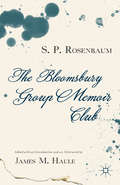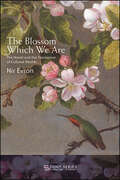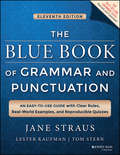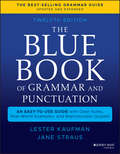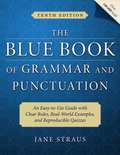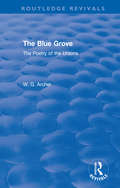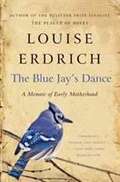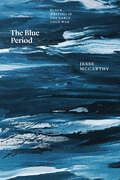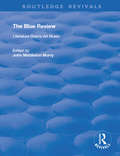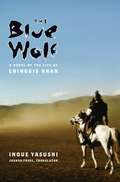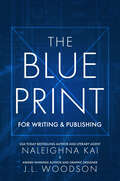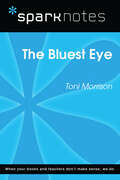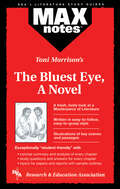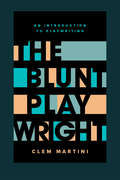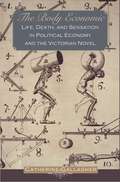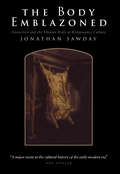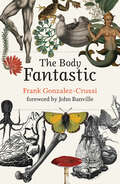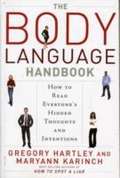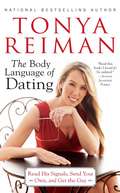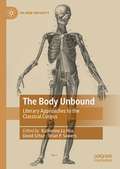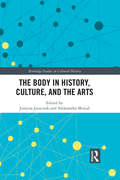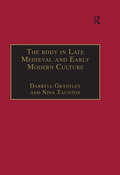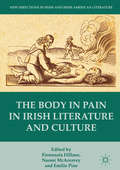- Table View
- List View
The Bloomsbury Group Memoir Club
by S. P. RosenbaumShortly before his death, S. P. Rosenbaum began work on the history of the Bloomsbury Group's 'Memoir Club'. With original archival material and valuable insights on leading Bloomsbury figures such as Woolf, Keynes and Forster, this illuminating book offers a new perspective on our understanding of twentieth-century autobiography and life writing.
The Blossom Which We Are: The Novel and the Transience of Cultural Worlds (SUNY series, Literature . . . in Theory)
by Nir EvronThe Blossom Which We Are traces the emergence of a distinctly modern form of human vulnerability—our intimate dependence on the fragile and time-bound cultural frameworks that we inhabit—as it manifests in the realm of the novel. Nir Evron juxtaposes seminal works from diverse national literatures to demonstrate that the trope of cultural extinction offers key insights into the emotional and ideological work performed by the realist novel. With an analysis that ranges from the works of Maria Edgeworth and Walter Scott, Edith Wharton's Age of Innocence and Joseph Roth's Radetzky March and Yaakov Shabtai's Past Continuous, and finally to the current state of the humanities, this book seeks to recover literary criticism's humanistic mission, bringing the best that has been thought and said to bear on urgent contemporary concerns.
The Blue Book of Grammar and Punctuation
by Jane Straus Tom Stern Lester KaufmanA revised and updated new edition of the bestselling workbook and grammar guideThe Blue Book of Grammar and Punctuation is a concise, entertaining workbook and guide to English grammar, punctuation, and usage. This user-friendly resource includes simple explanations of grammar, punctuation, and usage; scores of helpful examples; dozens of reproducible worksheets; and pre- and post-tests to help teach grammar to students of all ages. Appropriate for virtually any age range, this authoritative guide makes learning English grammar and usage simple and fun. This updated Eleventh Edition reflects the latest updates to English usage and grammar and features a fully revised two-color design and lay-flat binding for easy photocopying.Clear and concise, easy-to-follow, offering "just the facts"Fully updated to reflect the latest rules in grammar and usage along with new quizzesIdeal for students from seventh grade through adulthood in the US and abroadFor anyone who wants to understand the major rules and subtle guidelines of English grammar and usage, The Blue Book of Grammar and Punctuation offers comprehensive, straightforward instruction.
The Blue Book of Grammar and Punctuation: An Easy-to-Use Guide with Clear Rules, Real-World Examples, and Reproducible Quizzes
by Jane Straus Lester KaufmanThe best-selling workbook and grammar guide, revised and updated! Hailed as one of the best books around for teaching grammar, The Blue Book of Grammar and Punctuation includes easy-to-understand rules, abundant examples, dozens of reproducible exercises, and pre- and post-tests to help teach grammar to middle and high schoolers, college students, ESL students, homeschoolers, and more. This concise, entertaining workbook makes learning English grammar and usage simple and fun. This updated Twelfth Edition reflects the latest updates to English usage and grammar and features a two-color design and lay-flat binding for easy photocopying. Clear and concise, with easy-to-follow explanations, offering “just the facts” on English grammar, punctuation, and usage Fully updated to reflect the latest rules, along with quizzes and pre- and post-tests to help teach grammar Ideal for students from seventh grade through adulthood in the US and abroad For anyone who wants to understand the major rules and subtle guidelines of English grammar and usage, The Blue Book of Grammar and Punctuation offers comprehensive, straightforward instruction.
The Blue Book of Grammar and Punctuation: An Easy-to-use Guide with Clear Rules, Real-world Examples, and Reproducible Quizzes
by Jane Straus Mignon FogartyThe Blue Book of Grammar and Punctuation is filled with easy-to-understand rules, real-world examples, dozens of reproducible exercises, and pre- and post-tests. This handy workbook is ideal for teachers, students in middle school through college, ESL students, homeschoolers, and professionals. Valuable for anyone who takes tests or writes reports, letters, Web pages, e-mails, or blogs, The Blue Book offers instant answers to everyday English usage questions.
The Blue Grove: The Poetry of the Uraons (Routledge Revivals)
by W. G. ArcherOriginally published in 1940, The Blue Grove is a study of the poetry of the Uraons. This unique consideration of the poetry and folk song of the Uraons presents a wide range of poems organised by theme, including dance poems, cultivation poems, and marriage poems. It also includes examples of a Uraon marriage sermon, a Uraon farewell address, and Uraon riddles. The poems are preceded by a detailed analysis of Uraon marriages and dancing, providing important contextual information. The Blue Grove will appeal to anyone with an interest in the rich history of Uraon folk songs, poetry, and dance.
The Blue Jay's Dance: A Memoir Of Early Motherhood
by Louise ErdrichLouise Erdrich's first major work of nonfiction, The Blue Jay's Dance, brilliantly and poignantly examines the joys and frustrations, the compromises and the insights, and the difficult struggles and profound emotional satisfactions the acclaimed author experienced in the course of one twelve–month period—from a winter pregnancy through a spring and summer of new motherhood to her return to writing in the fall. In exquisitely lyrical prose, Erdrich illuminates afresh the large and small events that every parent will recognize and appreciate.
The Blue Period: Black Writing in the Early Cold War (Thinking Literature)
by Jesse McCarthyAddresses the political and aesthetic evolution of African American literature and its authors during the Cold War, an era McCarthy calls “the Blue Period.” In the years after World War II, to be a black writer was to face a stark predicament. The contest between the Soviet Union and the United States was a global one—an ideological battle that dominated almost every aspect of the cultural agenda. On the one hand was the Soviet Union, espousing revolutionary communism that promised egalitarianism while being hostile to conceptions of personal freedom. On the other hand was the United States, a country steeped in racial prejudice and the policies of Jim Crow. Black writers of this time were equally alienated from the left and the right, Jesse McCarthy argues, and they channeled that alienation into remarkable experiments in literary form. Embracing racial affect and interiority, they forged an aesthetic resistance premised on fierce dissent from both US racial liberalism and Soviet communism. From the end of World War II to the rise of the Black Power movement in the 1960s, authors such as Richard Wright, James Baldwin, Gwendolyn Brooks, and Paule Marshall defined a distinctive moment in American literary culture that McCarthy terms the Blue Period. In McCarthy’s hands, this notion of the Blue Period provides a fresh critical framework that challenges long-held disciplinary and archival assumptions. Black writers in the early Cold War went underground, McCarthy argues, not to depoliticize or liberalize their work, but to make it more radical—keeping alive affective commitments for a future time.
The Blue Review: Literature Drama Art Music Numbers One to Three, May 1913 - July 1913 (Routledge Revivals)
by John Middleton MurryOriginally published in 1913, this volume contains the full text of editions one, two and three of The Blue Review – the magazine of literature, drama, art and music - from May 1913 to July 1913.
The Blue Wolf: A Novel of the Life of Chinggis Khan (Weatherhead Books on Asia)
by Inoue YasushiOne of the world's most ruthless warriors, Chinggis Khan conquered nearly all of Asia in the twelfth and thirteenth centuries, transforming the scattered and impoverished Mongols into an exceptionally proud and powerful nation. In this riveting and thoroughly researched portrait, Japan's celebrated epic novelist drives at the root of the khan's great desires and insatiable appetite for supremacy.Beginning with his birth in 1162, The Blue Wolf follows the crucial alliances that led to Chinggis Khan's great campaigns in North China, Bukhara, and Samarkand, as well as the state of Khorazm. The khan was obsessed with his ancestry, not knowing whether he was the descendent of the blue wolf (mythical progenitor of the Mongols and the noble Borjigin line) or merely the bastard son of a Merkid tribesman. For Inoue Yasushi, Chinggis's ancestral anxiety lies at the center of his relentless push for empire. He struggled with his paternity as intensely as he fought his battles, and his victories stood as proof that the brave warrior was a true Mongol. The question of paternity also formed the largest wedge between Chinggis and his eldest son, Jochi, a boy born in captivity and of similarly questionable heritage. Hailed for its sophistication and rich imagining of a remote world, The Blue Wolf puts a human cast on a legendary force that changed Asia and the world.
The Blueprint for Writing & Publishing
by Naleighna Kai J. L. WoodsonThe Blueprint is the one book most authors wished they had before they took a bite of the publishing apple.USA Today bestselling author, publisher, and literary agent, Naleighna Kai, and award-winning, #1 bestselling author and graphic designer, J. L. Woodson, share their insight, wisdom, and publishing journeys—from self-publishing, to landing deals with a traditional publishing house, and achieving worldwide success.The experiences Kai and Woodson share will help aspiring writers learn from the mistakes they made along the way. They will also know how to make informed decisions about the best path to take.If this book does not inspire you to get off your butt and write … nothing will.
The Bluest Eye (SparkNotes Literature Guide Series)
by SparkNotesThe Bluest Eye (SparkNotes Literature Guide) by Toni Morrison Making the reading experience fun! Created by Harvard students for students everywhere, SparkNotes is a new breed of study guide: smarter, better, faster.Geared to what today's students need to know, SparkNotes provides:chapter-by-chapter analysis explanations of key themes, motifs, and symbols a review quiz and essay topics Lively and accessible, these guides are perfect for late-night studying and writing papers.
The Bluest Eye: A Novel
by Christopher HubertREA's MAXnotes for Toni Morrison's The Bluest Eye, A Novel MAXnotes offer a fresh look at masterpieces of literature, presented in a lively and interesting fashion. Written by literary experts who currently teach the subject, MAXnotes will enhance your understanding and enjoyment of the work. MAXnotes are designed to stimulate independent thought about the literary work by raising various issues and thought-provoking ideas and questions. MAXnotes cover the essentials of what one should know about each work, including an overall summary, character lists, an explanation and discussion of the plot, the work's historical context, illustrations to convey the mood of the work, and a biography of the author. Each chapter is individually summarized and analyzed, and has study questions and answers.
The Blunt Playwright: An Introduction to Playwriting
by Clem MartiniThe Blunt Playwright won’t tell you everything there is to know about playwriting. It won’t even try. What it will do is examine process, structure, dialogue, and character; provide classic and contemporary scenes to study; outline clever exercises to strengthen writing skills; and so much more. Highly regarded and used in schools everywhere, this updated edition cements its place as one of the best resources for playwrights. From organizing the structure of a script to developing characters’ voices, from employing visual effects on stage to writing comedy, or from self-promotion to getting produced and published, this guide has something for everyone, no matter the stage of their career.
The Boat Alphabet Book (Jerry Pallotta's Alphabet Books)
by Jerry PallottaAhoy, mateys! Get on board! Boats and the need for them have been around for thousands of years. Reed boats might have been the first boat ever to be built. The Vikings built wooden ships that were strong and ornate. And now boats like an Aircraft Carrier house 6,000 people and can carry over 100 planes. In Jerry Pallotta's newest book we get to see an entire alphabet of floating wonders. David Biedrzycki has provided dramatic settings for a variety of boats and captures the mood of each body of water. In one he paints a calm lake where a red canoe glides across the water and in another the stormy swells of an angry ocean tossing a three-masted Xebec. The facts about each boat are sprinkled with traditional Pallotta humor.
The Boatman: Henry David Theoreau's River Years
by Robert M. ThorsonRobert Thorson gives readers a Thoreau for the Anthropocene. The boatman and backyard naturalist was keenly aware of the way humans had altered the waterways and meadows of his beloved Concord River Valley. Yet he sought out for solace and pleasure those river sites most dramatically altered by human invention and intervention—for better and worse.
The Body Economic: Life, Death, and Sensation in Political Economy and the Victorian Novel
by Catherine GallagherThe Body Economic revises the intellectual history of nineteenth-century Britain by demonstrating that political economists and the writers who often presented themselves as their literary antagonists actually held most of their basic social assumptions in common. Catherine Gallagher demonstrates that political economists and their Romantic and early-Victorian critics jointly relocated the idea of value from the realm of transcendent spirituality to that of organic "life," making human sensations--especially pleasure and pain--the sources and signs of that value. Classical political economy, this book shows, was not a mechanical ideology but a form of nineteenth-century organicism, which put the body and its feelings at the center of its theories, and neoclassical economics built itself even more self-consciously on physiological premises. The Body Economic explains how these shared views of life, death, and sensation helped shape and were modified by the two most important Victorian novelists: Charles Dickens and George Eliot. It reveals how political economists interacted crucially with the life sciences of the nineteenth century--especially with psychophysiology and anthropology--producing the intellectual world that nurtured not only George Eliot's realism but also turn-of-the-century literary modernism.
The Body Emblazoned: Dissection and the Human Body in Renaissance Culture
by Jonathan SawdayAn outstanding piece of scholarship and a fascinating read, The Body Emblazoned is a compelling study of the culture of dissection the English Renaissance, which informed intellectual enquiry in Europe for nearly two hundred years. In this outstanding work, Jonathan Sawday explores the dark, morbid eroticism of the Renaissance anatomy theatre, and relates it to not only the great monuments of Renaissance art, but to the very foundation of the modern idea of knowledge. Though the dazzling displays of the exterior of the body in Renaissance literature and art have long been a subject of enquiry, The Body Emblazoned considers the interior of the body, and what it meant to men and women in early modern culture. A richly interdisciplinary work, The Body Emblazoned re-assesses modern understanding of the literature and culture of the Renaissance and its conceptualization of the body within the domains of the medical and moral, the cultural and political.
The Body Fantastic
by Frank Gonzalez-CrussiThe body in dreams, myths, legends, and anecdotes of the fantastic as expressions of human corporeality.In The Body Fantastic, Frank Gonzalez-Crussi looks at the human body through the lens of dreams, myths, legends, and anecdotes of the bizarre, exploring the close connection of the fictitious and the fabulous to our conception of the body. He chronicles, among other curious cases, the man who ate everything (including boiled hedgehogs and mice on toast), the therapeutic powers of saliva, hair that burst into flames, and an "amphibian man" who lived under water. Drawing on clinical records, popular lore, and art, history, and literature, Gonzalez-Crussi considers the body in both real and imaginary dimensions. Myths and stories, Gonzalez-Crussi reminds us, are the symbolic expression of our aspirations and emotions. These fantastic tales of bodies come from the deepest regions of the human psyche. Ancient Greeks, for example, believed that the uterus wandered around inside a woman's body--an "animal within an animal." If a woman sniffed an unpleasant odor, the uterus would retreat. Organized "digestive excess" began with the eating and drinking contests of antiquity and continue through the hot-dog eating competitions of today. And the "libido-podalic association," connecting male sexuality and the foot, insinuated itself into mainstream medicine in the sixteenth century; meanwhile, the feet of women in some cultures were scrupulously kept from view. Gonzalez-Crussi shows that the many imaginary representations of the body are very much a part of our corporeality.
The Body Language Handbook: How to Read Everyone's Hidden Thoughts and Intentions
by Gregory Hartley Maryann KarinchIn "The Body Language Handbook", the authors use candid photos of real people in stress-free situations, then juxtapose them against others showing the same people responding to different kinds of stimulus to illustrate the power of body language. By going step-by-step from the holistic to the detailed, you'll quickly discover when body language indicates something significant, and when an itch is just an itch.
The Body Language of Dating: Read His Signals, Send Your Own, and Get the Guy
by Tonya ReimanPrimal instinct meets the power of choice in this go-to guide to getting the guy. The last time you locked eyes with a gorgeous, manly specimen across the room or took a detour past the object of your affection, fluffing your locks on your way to the powder room, you probably didn't think you were performing an ancient mating dance. Whether the fashion of the day is miniskirts or mammoth hides, the knowing glances, chest puffing, hair tossing, and backside brandishing are all part of a complicated ritual choreographed over epochs and designed for your very survival. Thankfully, evolution has taken care of the hard part, leaving today's woman with the sometimes daunting task of deciphering the intriguing, often infuriating signals of modern man. In this smart, funny, and invaluable book, nationally renowned body language expert Tonya Reiman decodes the complicated dating game. While some of us seem to have been born with a razor-sharp "sexual instinct," the rest of us could use a little practice. Luckily, the formula for dating success is easy to learn. Within these pages, you'll discover how to display the body language necessary for making solid connections with potential mates, uncover the mysteries of man himself, and find handy new tricks for your attraction arsenal. Not only that, The Body Language of Dating will teach you how to: Whether you feel like you couldn't attract a fireman with your head ablaze or just want to give your seasoned connection-rejection ratio a boost, Tonya Reiman will help you shave time, effort, and heartbreak from your mating quest. She didn't make the rules, but she sure can teach you how to use them. * Read a guy's facial expressions, gestures, and posture for clues to his state of mind. * Tell long-term mates from short-term dates. (Hint: You can often tell just by looking at him!) * Send silent messages that tug on your hottie's heartstrings. * Save yourself from losers like Not-Interested Nate and Stalker Steve and get straight to Mr. Right (or Mr. Right Now). * Wield the science of scent in any social situation. Whether you feel like you couldn't attract a fireman with your head ablaze or just want to give your seasoned connection-rejection ratio a boost, Tonya Reiman will help you shave time, effort, and heartbreak from your mating quest. She didn't make the rules, but she sure can teach you how to use them.
The Body Unbound: Literary Approaches to the Classical Corpus (The New Antiquity)
by Katherine Lu Hsu David Schur Brian P. SowersThis book explores the body’s physical limits and the ways in which the confines of the body are delineated, transgressed, or controlled in literary and philosophical texts. Drawing on classics, philosophy, religious studies, medieval studies, and critical theory and examining material ranging from Homer to Game of Thrones, this volume facilitates an interdisciplinary investigation into how the boundaries of the body define the human form in language. This volume’s essays suggest that the body’s meaning is perhaps never more evident than in the violation of its wholeness. The boundaries of the body are areas of transition between states and are therefore vulnerable. As individuals find themselves isolated from their world and one another, their bodies regularly allow for physical interactions, incur transgressions and violations, and undergo profound transformations. Thus sympathy, sexuality, disease, and violence are among the main themes of the volume, which, ultimately, reexamines the place of the body in our understanding of what it means to be human.
The Body in History, Culture, and the Arts (Routledge Studies in Cultural History #72)
by Justyna Jajszczok Aleksandra MusiałThe aim of this book is to explore the body in various historical contexts and to take it as a point of departure for broader historiographical projects. The chapters in the volume present the ways in which the body constitutes a valuable and productive object of historical analysis, especially as a lens through which to trace histories of social, political, and cultural phenomena and processes. More specifically, the authors use the body as a tool for critical re-examination of particular histories of human experience, and of societal and cultural practices, thus contributing to the burgeoning area of body history in terms of both specific case studies as well as historiography in general.
The Body in Late Medieval and Early Modern Culture
by Nina TauntonTaking as its chronological starting-point the female body of late medieval devotional literature, the volume moves on to a consideration of the representation of gendered bodies in later literature. It then proceeds to examine sixteenth-century occupational orderings of the (male) body in education, the civil service and the army, and involves explorations into a variety of rituals for the purification, ordering and disciplining of the flesh. It includes enquiries into the miraculous royal body, demon bodies, the 'virtual' body of satire, and ends the late seventeenth century with dramatic representations of the diseased body, and the grotesque bodies of travellers’ tales as signifiers of racial difference. It pushes forward post-modern notions of the body as a site for competing discourses. It provides new dimensions to fantasies, rituals and regulations in narratives ('fictions') of the body as identifications of forms of knowledge unique to the early modern period. Each of the essays sheds new light on how these late medieval and early modern narratives function to produce specialized and discrete languages of the body that cannot be understood simply in terms, say, of religion, philosophy or physiology, but produce their own discrete forms of knowledge. Thus the essays materially contribute to an understanding of the relationship between the body and spatial knowledge by giving new bearings on epistemologies built upon pre-modern perceptions about bodily spaces and boundaries. They address these issues by analysing forms of knowledge constructed through regulations of the body, fantasies about extensions to the body and creations of bodily, psychic, intellectual and spiritual space. The essays pose important questions about how these epistemologies offer different investments of knowledge into structures of power. What constitutes these knowledges? What are the politics of corporeal spaces? In what forms of knowledge about spatial and bodily perceptions and p
The Body in Pain in Irish Literature and Culture
by Fionnuala Dillane Naomi Mcareavey Emilie PineThis book elucidates the ways the pained and suffering body has been registered and mobilized in specifically Irish contexts across more than four hundred years of literature and culture. There is no singular approach to what pain means: the material addressed in this collection covers diverse cultural forms, from reports of battles and executions to stage and screen representations of sexual violence, produced in response to different historical circumstances in terms that confirm our understanding of how pain - whether endured or inflicted, witnessed or remediated - is culturally coded. Pain is as open to ongoing redefinition as the Ireland that features in all of the essays gathered here. This collection offers new paradigms for understanding Ireland's literary and cultural history.
